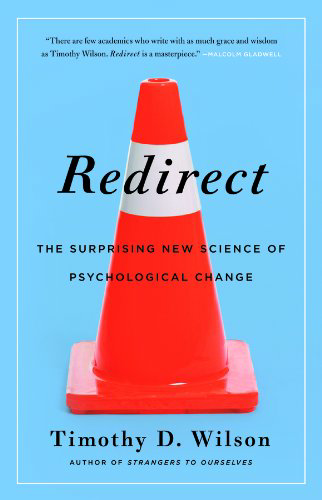Part of the Casswiki article series Books

Redirect is a book by Timothy D. Wilson, first published in 2011 as Redirect: The Surprising New Science of Psychological Change. It describes how the attitudes and behaviors of people can be changed by influencing the stories – or narratives – they tell themselves.
An important subject discussed in the book is how expressive writing can be used to deal with emotional trauma, and misconceptions about which kinds of interventions are helpful in the aftermath of traumatic events. (Commonly used group debriefing techniques such as CISD, employed immediately in the aftermath of traumatic events, are not only ineffective but can actually worsen the impact of the trauma.)
The rest of the book deals mainly with addressing societal issues, using principles of influencing the narratives people form, rather than with methods for individual psychological change. Here, too, the book contrasts what research has found to be effective with misguided interventions that are commonly used.
The book has more recently been published under the title Redirect: Changing the Stories We Live By.
Expressive writing and psychological health
Writing for 20 minutes on four consecutive days, focusing on the major traumatic or otherwise stressful events of one’s life, can be of great benefit. In translating the experiences into language, and placing them in a meaningful context – “making sense” of them – they become less “stuck” in the mind, and the same goes for the emotions connected to them. This can lead to significant improvements in overall well-being. Apart from change on the psychological level, physiological health also often improves, which is unsurprising in light of the mind-body connection.
The Cassiopaea Forum thread about Redirect contains more information about (as well as discussion of) the writing exercises.
See also
- Strangers to Ourselves
- Thinking, Fast and Slow
- You Are Not So Smart
- What Makes Your Brain Happy and Why You Should Do the Opposite
- Brain Changer
External links
- Cassiopae Forum: Redirect: The surprising new science of psychological change (Excerpts and discussion, in large part focusing on the very practical writing exercises suggested in the book, and the research findings behind them.)
- Writing to Heal (An article describing how expressive writing can be used as a route to healing.)
- Social Psychology: Redirect: Changing the Stories We Live By (A talk by Timothy D. Wilson, where he discusses what story-editing is, how it has been used, and its limitations.)
